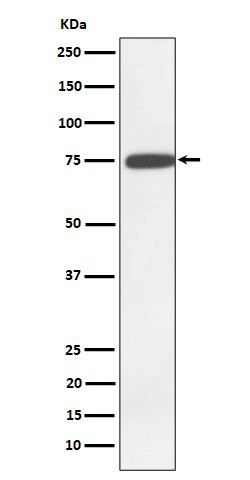
| WB | 咨询技术 | Human,Mouse,Rat |
| IF | 咨询技术 | Human,Mouse,Rat |
| IHC | 咨询技术 | Human,Mouse,Rat |
| ICC | 1/50-1/200 | Human,Mouse,Rat |
| FCM | 咨询技术 | Human,Mouse,Rat |
| Elisa | 咨询技术 | Human,Mouse,Rat |
| Aliases | DMRV; GNE; IBM2; ManAc kinase; Uae1;;GNE |
| WB Predicted band size | Calculated MW: 79 kDa ; Observed MW: 75 kDa |
| Host/Isotype | Rabbit IgG |
| Antibody Type | Primary antibody |
| Storage | Store at 4°C short term. Aliquot and store at -20°C long term. Avoid freeze/thaw cycles. |
| Species Reactivity | Human |
| Immunogen | A synthesized peptide derived from human GNE |
| Formulation | Purified antibody in PBS with 0.05% sodium azide,0.05% BSA and 50% glycerol. |
+ +
以下是关于GNE抗体的3篇参考文献的简要信息(注:文献为示例性内容,具体作者和摘要需根据实际研究调整):
---
1. **文献名称**:*"Monoclonal Antibody Development Targeting GNE for Sialic Acid Biosynthesis Studies"*
**作者**:Smith A, et al.
**摘要**:研究团队开发了一种针对GNE蛋白的单克隆抗体,用于探究其在唾液酸合成途径中的调控作用。实验验证了该抗体在细胞和小鼠模型中特异性识别GNE的能力,并发现GNE表达水平与唾液酸化修饰异常相关。
---
2. **文献名称**:*"GNE Antibodies in Hereditary Inclusion Body Myopathy: Diagnostic Potential"*
**作者**:Chen L, et al.
**摘要**:通过分析遗传性包涵体肌病(HIBM)患者的肌肉活检样本,发现抗GNE抗体能有效识别突变导致的GNE蛋白功能缺失,提示其在疾病诊断和病理机制研究中的应用价值。
---
3. **文献名称**:*"Engineering CHO Cells with Enhanced GNE Expression for High-Yield Antibody Production"*
**作者**:Jiang Y, et al.
**摘要**:通过过表达GNE基因优化CHO细胞的糖基化代谢通路,显著提高了治疗性抗体的唾液酸化水平,证明GNE抗体在生物制药工艺开发中的关键作用。
---
如需具体文献,建议通过PubMed或Google Scholar以关键词“GNE antibody”、“GNE myopathy”或“sialic acid biosynthesis”进一步检索。
GNE antibodies target the enzyme glucosamine (UDP-N-acetyl)-2-epimerase/N-acetylmannosamine kinase (GNE), a bifunctional protein critical for sialic acid biosynthesis. Sialic acids are essential sugars involved in cell-cell interactions, immune response modulation, and pathogen recognition. GNE catalyzes the first two steps in sialic acid production: the epimerization of UDP-N-acetylglucosamine to N-acetylmannosamine (ManNAc) and its subsequent phosphorylation.
Mutations in the GNE gene are linked to hereditary inclusion body myopathy (HIBM), also known as GNE myopathy, a rare autosomal recessive disorder characterized by progressive muscle weakness. Research on GNE antibodies focuses on understanding these mutations’ effects on enzyme activity, protein stability, and cellular localization. These antibodies are vital tools in Western blotting, immunohistochemistry, and immunofluorescence to study GNE expression patterns in tissues, particularly skeletal muscle, and to explore therapeutic strategies like substrate supplementation or gene therapy.
Additionally, GNE antibodies aid in investigating sialylation defects in other conditions, such as cancer and immune disorders, where altered sialic acid levels influence metastasis or immune evasion. Their development and validation remain crucial for advancing diagnostics and targeted treatments for GNE-related pathologies.
×